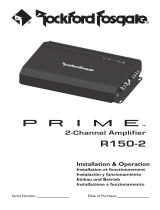
6
Installation
Contents
• Punch Powered Loaded Enclosure
• RCA/Speaker Harness
• Power Connector
• Remote Punch Level Control
• Installation & Operation Manual
• 2X 10A Fuses Spare
Installation Considerations
The following is a list of tools needed for installation:
This section focuses on some of the vehicle considerations
for installing your new powered loaded enclsoure. Pre-
planning your system layout and best wiring routes will
save installation time. When deciding on the layout of your
new system, be sure that each component will be easily
accessible for making adjustments.
If you feel unsure about installing this system yourself, have
it installed by a qualified technician.
Before installation, disconnect the
battery negative (-) terminal to prevent
damage to the unit, fire and/or possible
injury.
Before beginning any installation,
follow these simple rules:
1. Be sure to carefully read and understand the instructions
before attempting to install the unit.
2. For safety, disconnect the negative lead from the battery
prior to beginning the installation.
3. For easier assembly, we suggest you run all wires prior to
mounting your unit in place.
4. Route all of the RCA cables close together and away from
any high current wires.
5. Use high quality connectors for a reliable installation and to
minimize signal or power loss.
6. Think before you drill! Be careful not to cut or drill into gas
tanks, fuel lines, brake or hydraulic lines, vacuum lines or
electrical wiring when working on any vehicle.
7. Never run wires underneath the vehicle. Running the wires
inside the vehicle provides the best protection.
• Fuse-holder and fuse. (See
specifications for fuse
rating)
• Volt/Ohm Meter
• Wire strippers
• Wire crimpers
• Wire cutters
• #2 Phillips screwdriver
• Battery post wrench
• Hand held drill w/assorted
bits
• Assorted connectors
• Adequate Length—Red
Power Wire
• Adequate Length—Remote
Turn-on Wire
• Adequate Length—Black
Grounding Wire
8. Avoid running wires over or through sharp edges. Use
rubber or plastic grommets to protect any wires routed
through metal, especially the firewall.
9. ALWAYS protect the battery and electrical system from
damage with proper fusing. Install the appropriate fuse
holder and fuse on the +12V power wire within 18” (45.7
cm) of the battery terminal.
10. When grounding to the chassis of the vehicle, scrape
all paint from the metal to ensure a good, clean ground
connection. Grounding connections should be as short as
possible and always be connected to metal that is welded
to the main body, or chassis, of the vehicle. Seatbelt bolts
should never be used for connecting to ground.
Mounting Locations
Trunk or Passenger Compartment Mounting
Choose a structurally sound location to mount your powered
loaded enclosure. Mount the enclosure in such a manner
that the amplifier has a minimum of 1” (2.54cm) of air gap
around the amplifier’s heatsink to provide proper cooling
to ensure optimum performance of the amplifier is strongly
recommended.
Battery and Charging
Amplifiers will put an increased load on the vehicle’s battery
and charging system. We recommend checking your
alternator and battery condition to ensure that the electrical
system has enough capacity to handle the increased load
of your stereo system. Stock electrical systems which are in
good condition should be able to handle the extra load of any
Prime Series amplifier without problems, although battery
and alternator life can be reduced slightly. To maximize the
performance of your amplifier, we suggest the use of a heavy
duty battery and an energy storage capacitor.
Wiring the System
If you do not feel comfortable with
wiring your new unit, please see your
local Authorized Rockford Fosgate
Dealer for installation.
Before installation, disconnect the
battery negative (-) terminal to prevent
damage to the unit, fire and/or possible
injury.
Avoid running power wires near
the low level input cables, antenna,
power leads, sensitive equipment
or harnesses. The power wires carry
substantial current and could induce
noise into the audio system.
1. Plan the wire routing. Keep RCA cables close together but
isolated from the amplifier’s power cables and any high
power auto accessories, especially electric motors. This is
done to prevent coupling the noise from radiated electrical
fields into the audio signal. When feeding the wires through
the firewall or any metal barrier, protect them with plastic or
rubber grommets to prevent short circuits. Leave the wires
long at this point to adjust for a precise fit at a later time.












